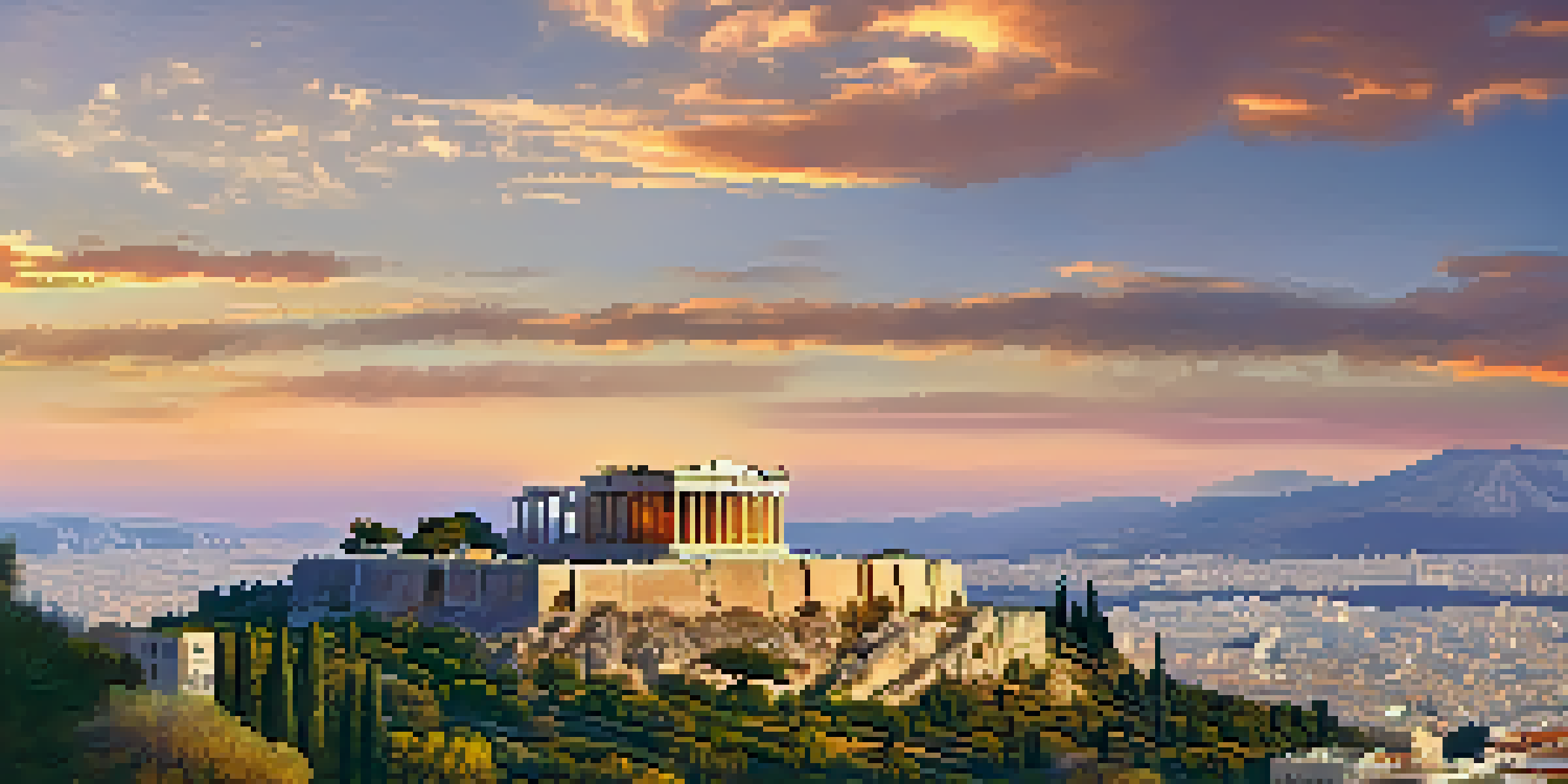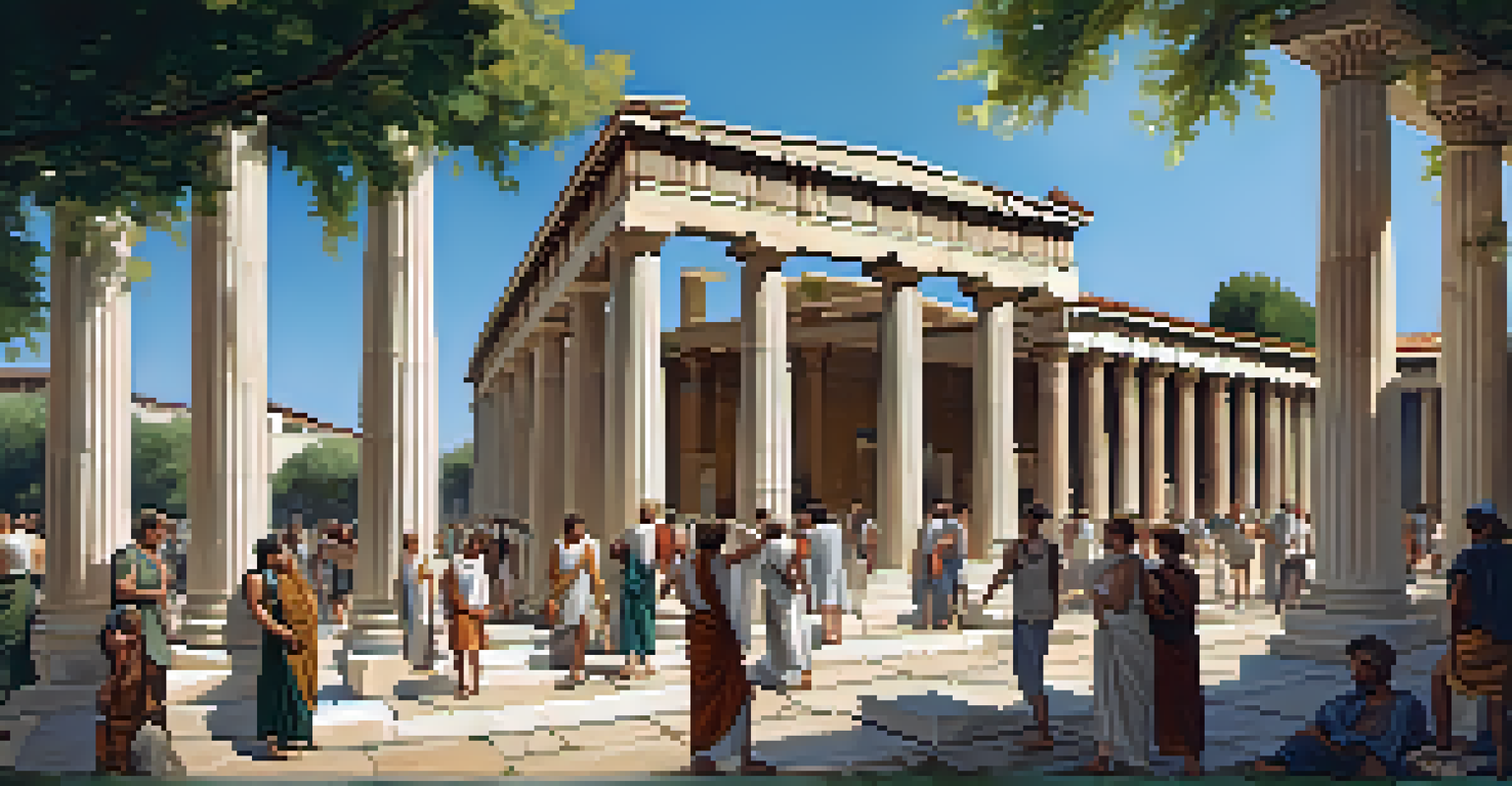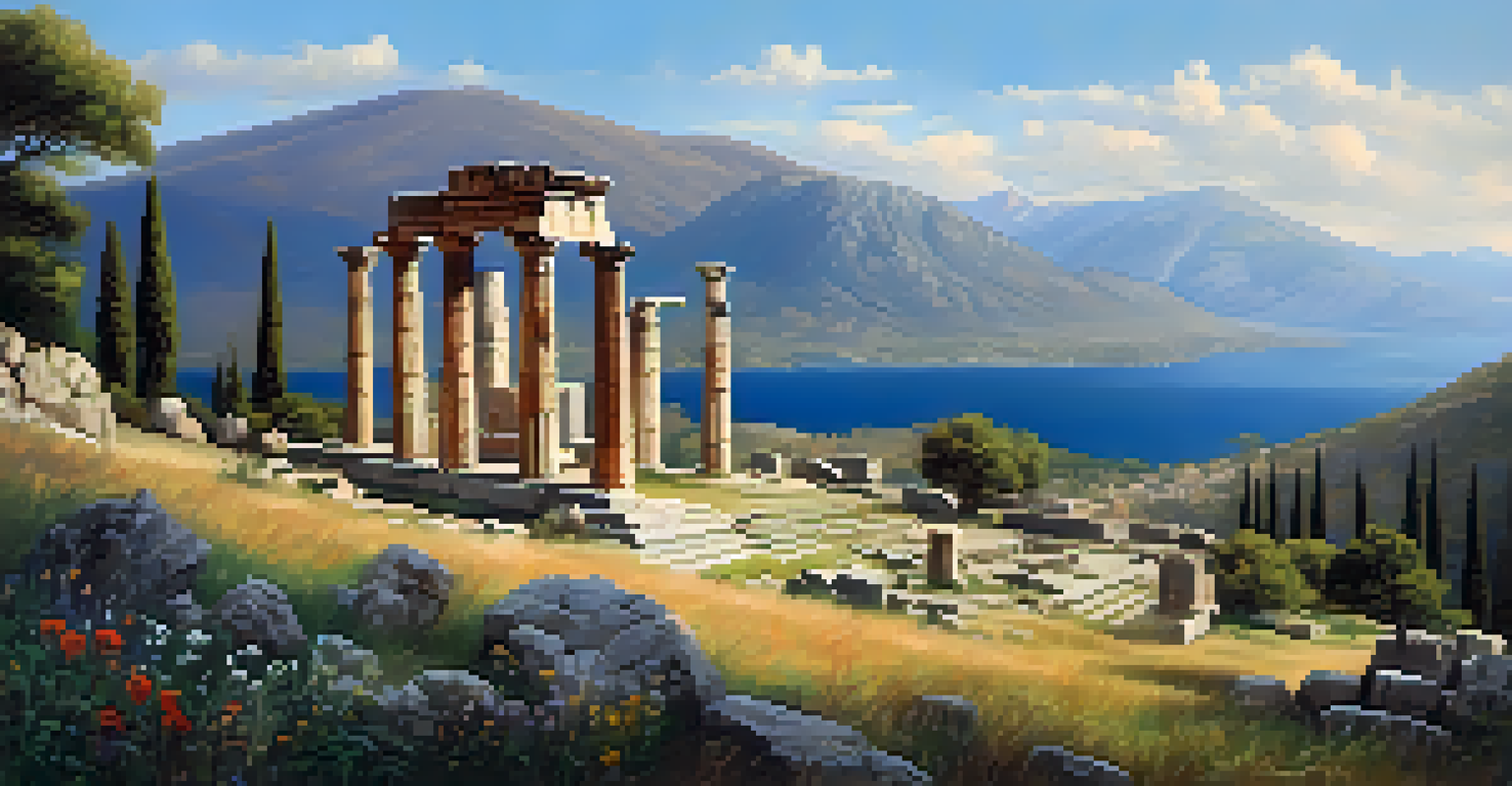Ancient Greece: Exploring the Ruins of Athens and Beyond

The Heart of Ancient Greece: The Acropolis of Athens
The Acropolis, a towering symbol of Ancient Greece, stands proudly above Athens, captivating visitors with its grandeur. This ancient citadel is home to remarkable structures like the Parthenon, dedicated to the goddess Athena, who was believed to be the protector of the city. As you wander through its ruins, you can almost feel the echoes of history reverberating beneath your feet.
The greatest discovery of my generation is that a human being can alter his life by altering his attitude.
Beyond its stunning architecture, the Acropolis was a center of cultural, political, and religious activity. Imagine the vibrant ceremonies and philosophical debates that took place here, shaping the very foundations of Western civilization. Every corner of this site tells a story, inviting us to reflect on the brilliance of a society that gave birth to democracy, theatre, and art.
Visiting the Acropolis is more than just a sightseeing trip; it's an encounter with the ancient world. The sweeping views of Athens remind you of the city's evolution over millennia, making it a perfect starting point for exploring the rich tapestry of Greek history.
Delving into the Ancient Agora: The Marketplace of Ideas
Just a stone's throw from the Acropolis lies the Ancient Agora, once the bustling heart of Athenian life. This marketplace was where citizens gathered not just to trade goods, but to exchange ideas, making it a vital hub for democracy and philosophy. Walking through its ruins, you can imagine Socrates engaging in spirited discussions with fellow citizens.

The Agora was also home to temples and public buildings, including the Stoa of Attalos, which has been meticulously reconstructed. This structure not only offers insight into ancient architecture but also serves as a museum showcasing artifacts that tell the stories of daily life in Athens. Each exhibit invites you to delve deeper into the lives of the people who once roamed these spaces.
Acropolis: A Cultural Epicenter
The Acropolis stands as a testament to Ancient Greece's architectural brilliance and its role as a hub of democracy and philosophy.
Exploring the Ancient Agora is like stepping into a time machine, where the past feels alive. It’s a reminder of the fundamental role that public discourse played in shaping a democratic society, making it a must-visit for anyone intrigued by the roots of modern governance.
The Mystique of Delphi: Home of the Oracle
Nestled in the foothills of Mount Parnassus, Delphi was revered as the center of the ancient world, known for its Oracle who foretold the future. Pilgrims from all over Greece would journey here, seeking guidance and wisdom from the Pythia, the priestess who delivered cryptic messages. The atmosphere is still charged with a sense of mystique, making it a fascinating site to explore.
History is not a burden on the memory but an illumination of the soul.
The Temple of Apollo, where the Oracle resided, is a highlight of Delphi. Although it now stands in ruins, its historical significance is undeniable. You can almost hear the whispers of those who sought answers to life's most profound questions, surrounded by stunning natural beauty that enhances the site's spiritual allure.
Visiting Delphi is not just about the ruins; it's about experiencing a place that was once considered the navel of the world. The breathtaking views from the site also provide a reflective space, allowing you to ponder the ancient beliefs and practices that shaped Greek culture.
Olympia: The Birthplace of the Olympic Games
Olympia, famously known as the birthplace of the Olympic Games, is a site steeped in athletic tradition and reverence. Here, athletes from various city-states would gather every four years to compete in honor of Zeus, showcasing not just physical prowess but also the spirit of unity. Walking through the ruins, you can almost feel the adrenaline from the games echoing through time.
The remains of the ancient stadium, where the first Olympic events took place, are a highlight of the site. Standing there, you can envision the roar of the crowd as competitors raced towards glory. The Olympic flame, which still symbolizes peace and competition today, has its roots deeply planted in this historic ground.
Delphi: Center of Ancient Wisdom
Delphi was revered for its Oracle, attracting pilgrims who sought guidance and insight into the mysteries of life.
Visiting Olympia is a reminder of the importance of sports in ancient Greek culture, a tradition that continues to thrive worldwide. It’s a celebration of athleticism, community, and the enduring legacy of the games that unite us even today.
Exploring the Island of Delos: A Sacred Birthplace
The island of Delos, a UNESCO World Heritage site, is often regarded as one of the most important archaeological sites in Greece. According to mythology, it was the birthplace of Apollo and Artemis, making it a sacred place for worship and pilgrimage. Today, the ruins tell the story of a thriving metropolis that once attracted visitors from across the ancient world.
The extensive ruins of temples, marketplaces, and residences paint a vivid picture of life in Delos. One of the most fascinating sites is the Terrace of the Lions, which once guarded the Sacred Lake. These majestic statues not only showcase ancient artistry but also symbolize the island's significance in Greek culture and religion.
Visiting Delos is like stepping into a living museum, where every stone has a story to tell. The tranquil atmosphere, combined with its rich history, makes it an essential stop for anyone seeking to understand the spiritual and cultural fabric of ancient Greece.
The Enigmatic Ruins of Corinth: A City of Contrasts
Corinth, a city of great strategic importance in ancient times, offers a fascinating glimpse into the contrasts of Greek life. Once a powerful commercial center, its ruins reveal a blend of wealth, innovation, and cultural exchange. As you explore, you’ll encounter remnants of grand temples and bustling marketplaces that reflect its vibrant past.
The Temple of Apollo, with its impressive columns, stands as a testament to Corinth's architectural achievements. Nearby, the Acrocorinth, a fortress on a hill, provides panoramic views that once allowed its inhabitants to oversee trade routes and protect the city. This duality of commerce and defense illustrates the complexities of life in ancient Corinth.
Olympia: Birthplace of the Olympics
Olympia is celebrated as the birthplace of the Olympic Games, embodying the spirit of competition and unity in ancient Greek culture.
Wandering through Corinth's ruins invites you to appreciate how interconnected ancient Greek cities were, both culturally and economically. It’s a reminder of the role that trade and military strategy played in shaping the political landscape of the time.
The Roman Influence: Ancient Ruins in Greece
While Ancient Greece is often celebrated for its own achievements, the Roman Empire left an indelible mark on the region, blending cultures and architectural styles. Many ruins you see today, such as the Odeon of Herodes Atticus in Athens, were built during the Roman period, showcasing their love for grandeur and public entertainment. This fusion of Greek and Roman influences creates a unique historical narrative.
The ruins of ancient theaters, baths, and temples reflect the Romans' appreciation for Greek art, philosophy, and civic life. As you stroll through these remnants, you can witness how the Romans adapted and expanded upon Greek designs, resulting in structures that still captivate us today.

Exploring the Roman ruins in Greece is like piecing together a puzzle of history, revealing how two great civilizations interacted and influenced one another. It offers a deeper understanding of the ancient world and its lasting legacy that continues to inspire modern architecture and culture.